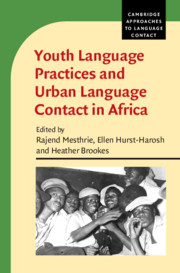Book contents
- Youth Language Practices and Urban Language Contact in Africa
- Cambridge Approaches to Language Contact
- Youth Language Practices and Urban Language Contact in Africa
- Copyright page
- Contents
- Figures
- Tables
- Contributors
- Series Editor’s Foreword
- Preface
- Abbreviations
- Introduction
- 1 Language Contact and Structure in Urban IsiXhosa and Associated Youth Languages
- 2 Not ‘Deep’ but Still IsiXhosa:
- 3 Rethinking Youth Language Practices in South Africa:
- 4 Tsotsitaals, Urban Vernaculars and Contact Linguistics
- 5 Grammatical Hybridity in Camfranglais?
- 6 Sheng and Engsh in Kenya’s Public Spaces and Media
- 7 Exploring Hybridity in Ivorian French and Nouchi
- 8 Authenticity and the Object of Analysis:
- Index
- References
7 - Exploring Hybridity in Ivorian French and Nouchi
Published online by Cambridge University Press: 20 August 2021
- Youth Language Practices and Urban Language Contact in Africa
- Cambridge Approaches to Language Contact
- Youth Language Practices and Urban Language Contact in Africa
- Copyright page
- Contents
- Figures
- Tables
- Contributors
- Series Editor’s Foreword
- Preface
- Abbreviations
- Introduction
- 1 Language Contact and Structure in Urban IsiXhosa and Associated Youth Languages
- 2 Not ‘Deep’ but Still IsiXhosa:
- 3 Rethinking Youth Language Practices in South Africa:
- 4 Tsotsitaals, Urban Vernaculars and Contact Linguistics
- 5 Grammatical Hybridity in Camfranglais?
- 6 Sheng and Engsh in Kenya’s Public Spaces and Media
- 7 Exploring Hybridity in Ivorian French and Nouchi
- 8 Authenticity and the Object of Analysis:
- Index
- References
Summary
Nouchi is studied from a formal point of view as hybrid or mixed speech. From a sociolinguistic point of view, it is seen as slang or youth language. Hybridity is interpreted as a symbol of the coming together of all the languages of Côte d’Ivoire, like a combination of all the ethnic groups of the nation itself. However, hybridity is mostly approached from a lexical point of view, wherein the authors attempt to analyse the heterogeneous lexicon of Nouchi. Regarding the lexicon, the big distinction with Ivorian French is the massive incorporation of words, or morphemes in the case of hybrid words, of the Niger–Congo languages of the Ivory Coast and others. The questions posed in this chapter are (1) whether Nouchi also employs hybridity in syntax, phonology or spelling; and (2) whether Ivorian French, which acts as the base language, is not already largely hybrid. My hypothesis is that a hybrid language like Nouchi emerges in a social context where the process of hybridisation has already begun by pooling various social resources to build a space welcoming diversity.
Keywords
Information
- Type
- Chapter
- Information
- Youth Language Practices and Urban Language Contact in Africa , pp. 159 - 181Publisher: Cambridge University PressPrint publication year: 2021
References
Accessibility standard: Unknown
- 1
- Cited by
